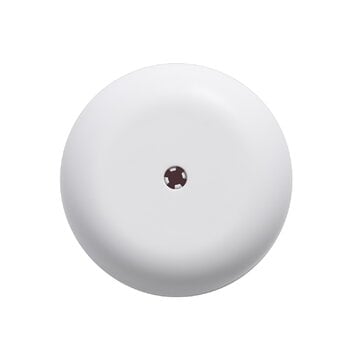This white ceiling cap is an accessory for Muuto’s E27 pendant.
E27 pendant ceiling cap
Muuto
Description
This white ceiling cap is an accessory for Muuto’s E27 pendant.
Product details (5)
- Material
- Plastic
- Colour
- White
- Width
- 9 cm
- Diameter
- 9 cm
- Height
- 5.6 cm
- Product ID
Designer
Mattias Ståhlbom (b. 1971) is a Swedish architect and designer who studied Interior Architecture and Furniture Design at the Konstfack University of Arts, Crafts and Design in Stockholm. He is a partner in the internationally successful Swedish design and architecture studio TAF Architects, run together with the Swedish architect Gabriella Gustafson.
Mattias Ståhlbom’s product designs have been exhibited in prestigious museums such as the MoMA in New York and the Swedish National Museum in Stockholm. Mattias Ståhlbom has displayed his products also at major trade fairs such as Swedish Style in Tokyo, the Furniture Fair in Milan and the Design Fair in Seoul. He has designed furniture and kitchen utensils for a number of well-known Swedish companies and worked in the field of design in New York. He has also received numerous awards, including the “Young Design” award.
One of Mattias Ståhlbom’s most famous product is the E27 socket lamp, which has become an international success. Thus he comments about his creation: “The simplicity of the naked bulb is hard to compete with. It stands for something that feels romantic and contemporary at the same time. E27 departs from the essence of a lamp - the socket – creating a simple yet strong object that celebrates the potential beauty in simplicity”.
View all productsReviews (0)
Sustainability
The Product Sustainability Framework, our criteria of sustainable design, helps you find the most sustainable products in our selection. Read below which sustainability criteria this product has met.
Working conditions & labour 7/9
-
Equal opportunities for all employees
-
Commitment to UN Global Compact, fair compensation for all employees
-
Corporate responsibility requirements defined and communicated for suppliers
-
Systematic work for improved inclusion and well-being in the workplace
-
Transparent supply chain
-
Suppliers' compliance to a code of conduct ensured
-
Compliance to the UN Guiding Principles on Business and Human Rights ensured in the supply chain
-
Direct suppliers audited and certified
-
Support for community involvement in the supply chain
Eco-friendly production 9/9
-
Fair and resource-wise water-use in production
-
No incineration or landfilling of returned items
-
No use of endangered species as materials
-
No direct environmental emissions or waste (excl. GHGs) from production
-
The sustainability of direct suppliers' production is addressed and monitored
-
Production and material sourcing that respect biodiversity, animal rights, and natural ecosystems
-
Material-efficient and ecological packaging
-
Positive impact on nature’s well-being through operations that regenerate natural ecosystems
-
No potentially harmful chemicals used in own production
Climate impact 4/8
-
Company's direct greenhouse gas emissions identified and commitment to reduction
-
Product's carbon impact identified and commitment to reduction
-
Guidance on energy- and eco-efficient use of the product
-
Contribution to climate initiatives beyond the brand’s direct operations
-
Low-carbon or compensated transportation
-
Carbon footprint of the product calculated and goals set to reduce it
-
100 % renewable energy in own production and operations
-
Carbon neutral or carbon negative product
Sustainable materials 3/6
-
Sustainable and long-lasting material choices
-
No harmful or hazardous substances
-
Responsible raw material sourcing and production
-
Materials suited for circularity: monomaterials, recyclable finishings, renewable or recycled contents etc.
-
Ecological materials: natural, biodegradable, recyclable or recycled contents
-
Outstanding materials in terms of innovativeness, responsibility, sustainability and circularity: local production or sourcing, 100 % recycled content, C2C-certification etc.
Circular design 4/5
-
High aesthetic quality promoting long-term use of the product
-
Technically durable product design and material choices
-
Design for enduring life-long quality
-
Design and support for product maintenance, repair and upgradability
-
Innovative circular design solutions: circular service system, resale platform, remanufacturing, collection of used products, etc.




